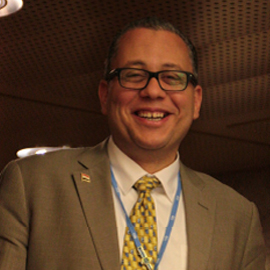
Mohamed El-Moghazi
Dr. Mohamed El-Moghazi, an alumnus of the 2017 PTC Young Scholar Program, is the Spectrum Management Research and Studies Director at the National Telecom Regulatory Authority (NTRA) of Egypt. At present, he is responsible for spectrum planning and pricing for new and current services. El-Moghazi earned his Ph.D. from the University of Strathclyde.
He has been involved in many activities at NTRA including the national broadband plan, a digital switchover plan, 3G and WIMAX licensing, and spectrum pricing for VHF, UHF, MW, and satellite services. Most importantly, he developed a customized tool to calculate the spectrum requirements for broadband in Egypt for the next ten years.
El-Moghazi has published several papers in prestigious conferences and journals including TPRC, ITS Europe, CPR Asia, DySPAN, and Intermedia. His research focuses on the international spectrum management regime, spectrum pricing, spectrum re-farming, opportunistic access, CRS, TVWS, spectrum commons, spectrum trading, ITU-R, and the developing countries.
He was recently responsible for the spectrum component in the successful $2 billion 4G license awarding process in Egypt in October 2016. Moreover, his Ph.D. thesis was used as the basis for a main panel in the 44th TPRC on the interaction between international spectrum regime and national policies. El-Moghazi presented his ideas to the ITU-R community in various events (e.g. WRCs) on spectrum flexibility and pricing. He was also the main promoter of a new agenda item for the World Radiocommunication Conference of 2023 to review the spectrum allocation of the broadcasting service in the band 470-960 MHz in Africa, Europe, and the Middle East.
With respect to his future goals and research focus, one major topic is the policy diffusion between the international spectrum management regime and national spectrum policy. This accommodates different areas of research such as game theory, regime theory, and institutional arrangements. The second topic of focus is IoT spectrum-related issues. In particular, the future spectrum requirements for these IoT systems, and also the way IoT spectrum will be allocated and whether it will be harmonized globally, such as the case for 4G or regionally similar to the SRD. How this could influence the different business models related to IoT is also important. The third topic of interest is related to technology standardization activities and how the uncooperative and sometimes competing standardization actors interact through the ITU-R, ITU-T, IEEE, 3GPP, and other standardization organizations to achieve their interests. The fourth topic is related to the developing countries and the influence of spectrum availability on mobile broadband adoption in these countries
In August 2017, he presented a paper at the European International Telecommunication Society conference in Passau on the future of international radio regulations and the way forward for transformation toward more sharing in these regulations. He has also contributed to the ITU-R on the candidate bands for IMT in the forthcoming World Radiocommunication Conference in 2019.
El-Moghazi credits PTC for exposing him to the industry and academia as a Young Scholar at PTC’17 and at Spectrum Futures 2016. Involvement in PTC will certainly continue to help enable him to change the world we are living into a better place.






